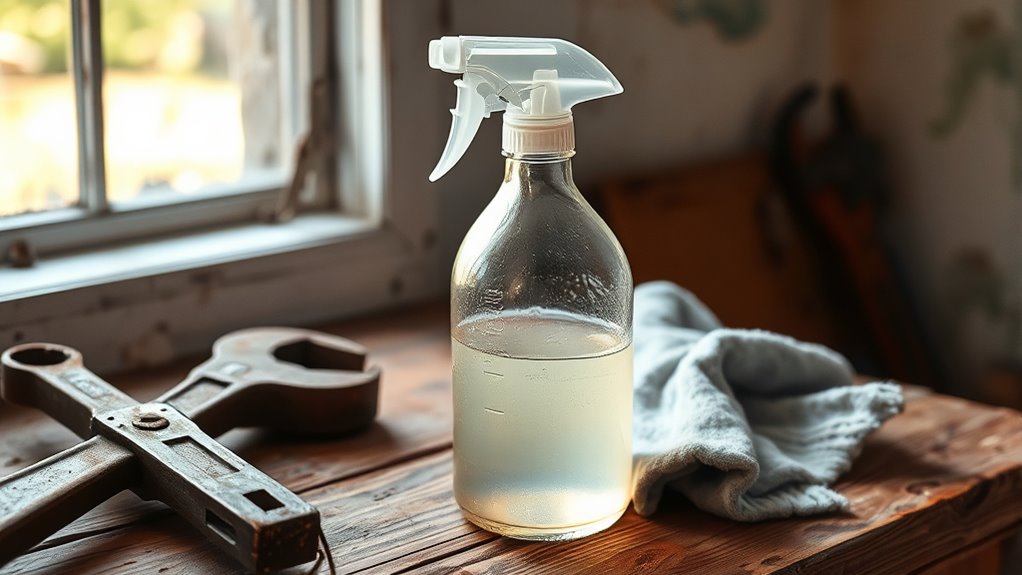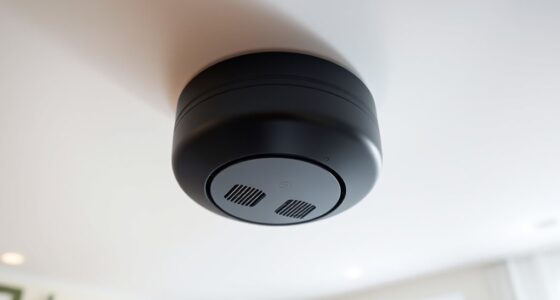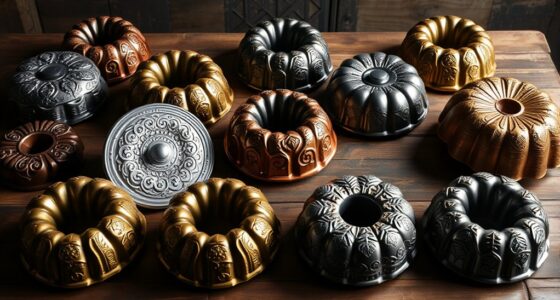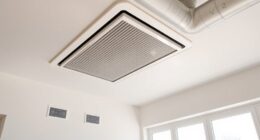Vinegar is your secret weapon for home repairs because it’s natural, versatile, and highly effective. It can revive thickened wood glue, dissolve mineral deposits, and remove hard water stains with ease. Its cleaning power cuts through grime, rust, and soap scum without harmful chemicals. Plus, it’s eco-friendly and safe around kids and pets. Keep exploring how vinegar can transform your household chores—there’s more to discover that can save you time and money.
Key Takeaways
- Vinegar effectively thins wood glue, extending its usability and improving repair quality.
- It dissolves mineral deposits and hard water stains, making cleaning and descaling easier and eco-friendly.
- Vinegar removes rust and soap scum, preventing corrosion and maintaining household fixtures.
- Its natural disinfectant properties eliminate odors and bacteria, promoting a healthier environment.
- As a biodegradable, chemical-free solution, vinegar offers a safe, sustainable alternative to commercial cleaning products.
Restoring and Reviving Thickened Wood Glue
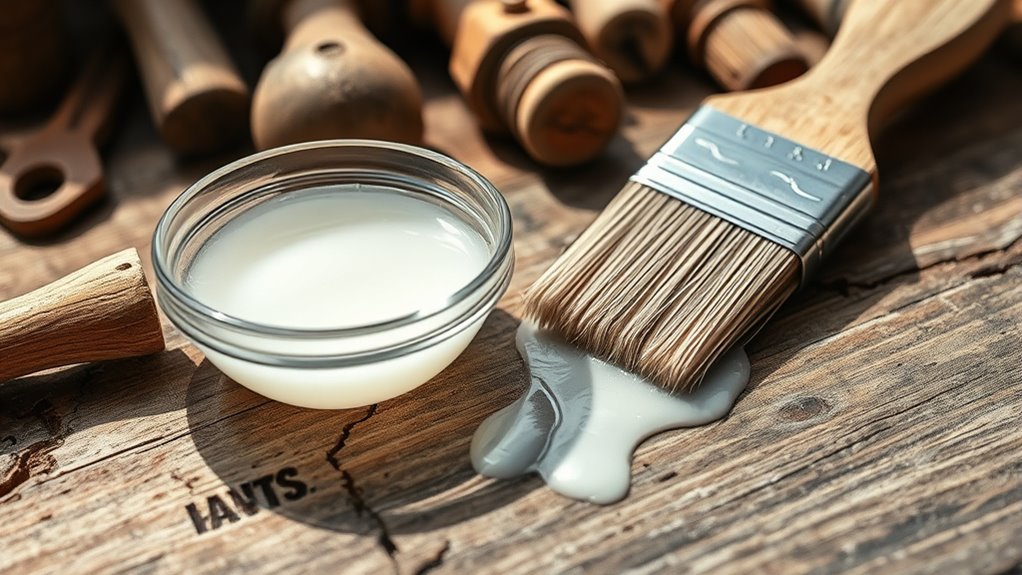
Have you ever noticed your wood glue thickening and becoming hard to work with? This happens when water or acetic acid evaporates, increasing its viscosity. Luckily, you can restore and revive your adhesive with a simple homemade solution. Add a few drops of vinegar—preferably distilled white vinegar with about 5% acetic acid—to the glue bottle. Stir thoroughly and check the flow; if needed, add more vinegar gradually. Vinegar acts as a thinning agent, helping to loosen the thickened glue for smooth application. Properly thinned wood glue with vinegar extends its usability, saving you money and effort. This method keeps your adhesive fresh and effective, making it ideal for repairs and projects around your home. Keep your glue workable with just a splash of vinegar.
Natural Cleaning and De-Scaling Solutions
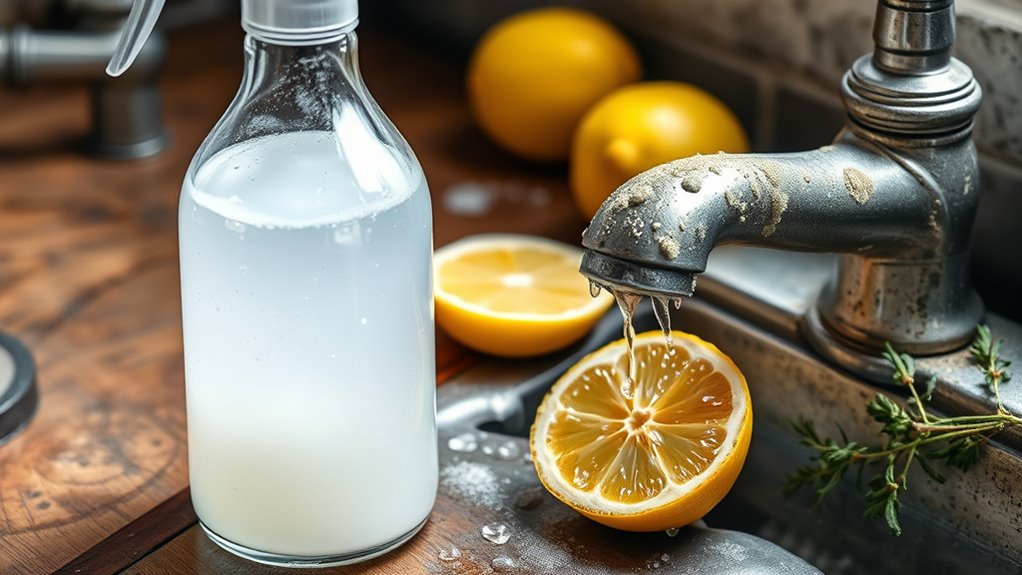
Vinegar is a powerful natural cleaner that effectively dissolves mineral deposits like limescale, soap scum, and hard water stains without relying on harsh chemicals. White distilled vinegar acts as an excellent household cleaner, helping you descaling appliances such as coffee makers, kettles, and showerheads, which extends their lifespan. Its acetic acid naturally removes mineral deposits and restores surfaces’ shine. You can also use vinegar to remove rust from metal tools or fixtures, preventing corrosion. As an odor neutralizer, vinegar keeps your space smelling fresh without chemicals. Regularly applying vinegar solutions not only cleans surfaces but also prevents future buildup, maintaining overall surface health. This environmentally friendly approach makes vinegar an essential part of your natural cleaning toolkit, ensuring a safe, effective, and sustainable home.
Using vinegar to descale appliances like coffee makers aligns with French Press Operation principles, ensuring your brewing equipment remains in optimal condition for the best-tasting coffee.
Removing Mineral Deposits and Hard Water Stains
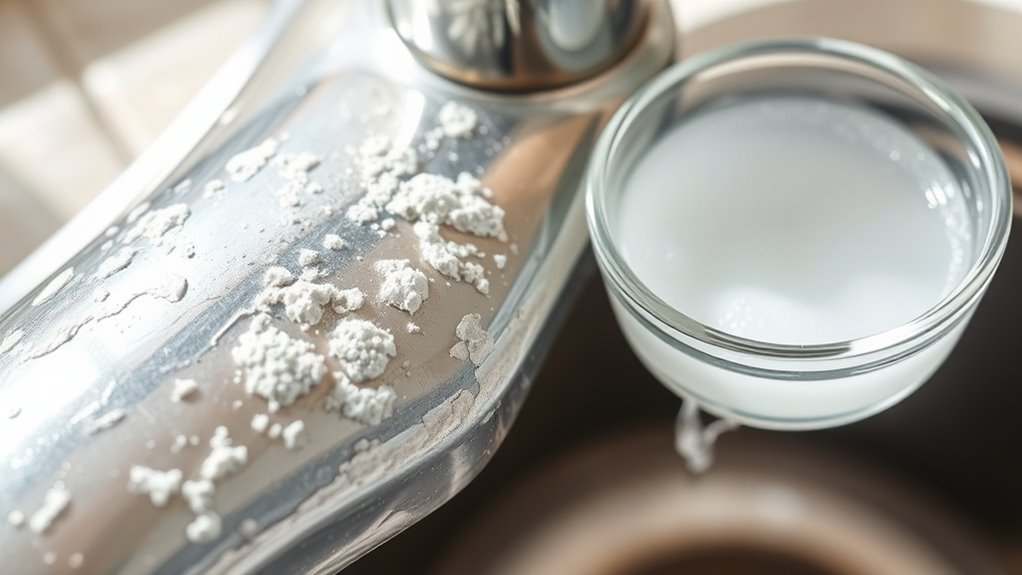
Struggling with stubborn mineral deposits and hard water stains? Vinegar is your go-to cleaning solution. Its acetic acid reacts with calcium carbonate, breaking down mineral buildup and making hard water stain removal easier. Apply a vinegar-water mixture directly to fixtures, glass, or tiles, and let it sit for 15–30 minutes. This descaling process loosens mineral deposits, simplifying mineral deposits removal. For sinks and showerheads, spray with the vinegar-water solution and scrub or rinse thoroughly. Regular use prevents future buildup and extends appliance lifespan. Using vinegar as a natural cleaning agent is safe and effective for many household surfaces. Its affordability and availability make it an accessible option for routine maintenance and eco-friendly cleaning. Additionally, incorporating proper home heating solutions, such as heat pumps with quieter operation technology, can improve indoor air quality and comfort. Here’s a visual:
| Surface | Action | Result |
|---|---|---|
| Faucets | Apply vinegar, wait, scrub | Hard water stain removal |
| Glass | Spray, soak, wipe | Streak-free shine |
| Showerheads | Soak in vinegar, scrub | Reduced mineral deposits |
| Kettles | Descale with vinegar, rinse | Clean, mineral-free interior |
| Tiles | Spray, scrub, rinse | Bright, stain-free surface |
Vinegar makes mineral deposit removal simple and effective.
Household Repairs and Maintenance Tips
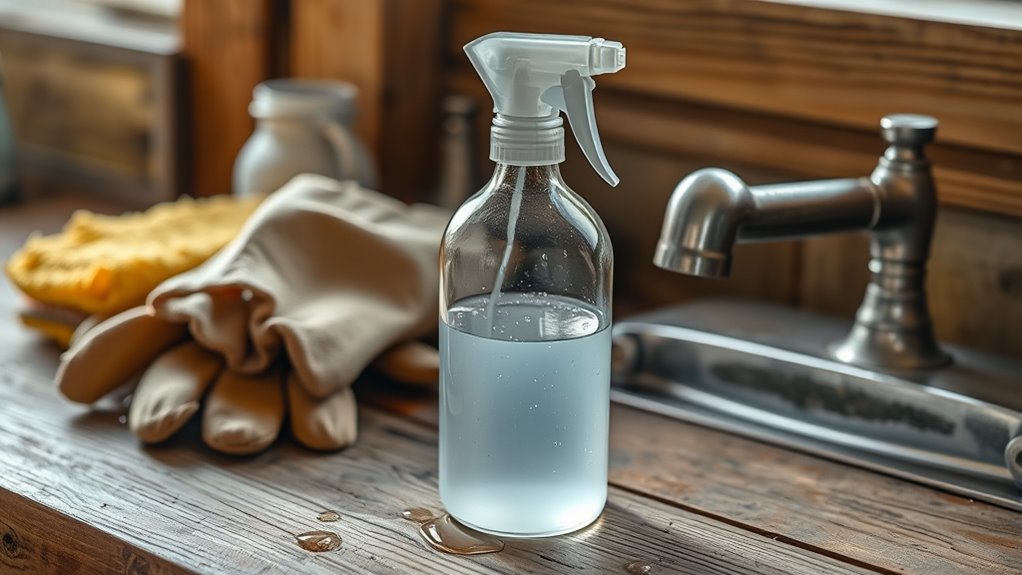
Using vinegar in household repairs and maintenance can save you time and money by tackling common issues with simple solutions. For stubborn stains and mineral deposits, vinegar dissolves soap scum and hard water buildup, making cleaning more effective. It’s also great for brightening grout lines and removing rust from tools, extending their lifespan. In DIY home maintenance, vinegar acts as a natural disinfectant and odor eliminator, keeping your space fresh. You can use it to loosen old wallpaper adhesive or clean appliances without harsh chemicals. Regular household repairs with vinegar reduce grime buildup and mold growth, especially in damp areas. Additionally, understanding the contrast ratio of your projector can significantly improve your home cinema experience by providing deeper blacks and brighter whites. Incorporating eco-friendly cleaning materials into your routine can further enhance the sustainability of your household maintenance practices. Moreover, choosing a trusted custodian for your Gold IRA ensures your investments are compliant and secure, helping you safeguard your retirement future. Using vinegar can also support emotional regulation by providing a safe and natural cleaning alternative that reduces exposure to harsh chemicals, creating a healthier living environment.
Safe and Eco-Friendly Alternatives to Commercial Products
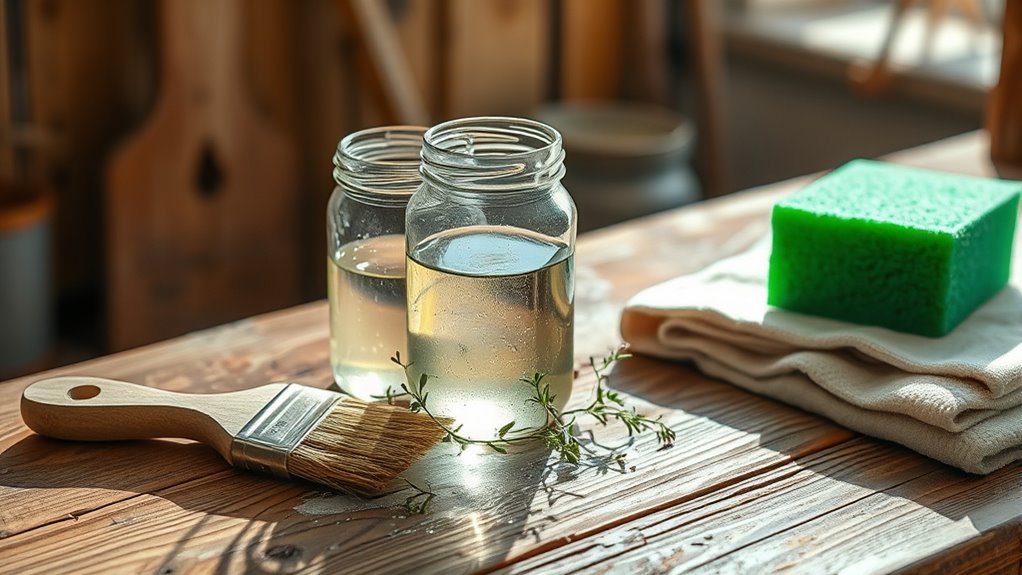
Switching to natural, eco-friendly cleaning options not only benefits your home but also helps protect the environment. Vinegar is a biodegradable, chemical-free solution that effectively disinfects surfaces and eliminates odors without harmful residues. Its non-toxic nature makes it safe to use around children and pets, unlike many commercial products filled with toxic chemicals. Vinegar’s high acidity allows you to clean and disinfect without hazardous fumes, making it an environmentally safe choice. Using vinegar supports sustainable practices by reducing plastic waste and decreasing reliance on single-use chemical cleaners. Additionally, storing vinegar in dark glass bottles helps maintain its potency over time. Properly adjusting vinegar concentration for different cleaning tasks ensures optimal results and safety. Incorporating vinegar into your routine can also reduce chemical exposure, promoting a healthier living space. Understanding narcissistic behavior can help you recognize and avoid toxic influences that might otherwise undermine your well-being. By choosing natural, eco-friendly alternatives like vinegar, you’re making a conscious decision to keep your home clean and healthy while minimizing your ecological footprint.
Frequently Asked Questions
Does Vinegar Have Healing Properties?
You might wonder if vinegar has healing properties. It does, thanks to its natural antiseptic and antimicrobial effects. When you apply diluted vinegar to minor cuts or skin irritations, it can help prevent infection and reduce inflammation. Vinegar also supports healing of fungal infections like athlete’s foot. Just remember, it’s not a substitute for medical treatment, but it can be a helpful addition for minor wound care at home.
What Does Vinegar Do Around the House?
Vinegar works wonders around your house by tackling grime, soap scum, and mineral deposits, making cleaning more effective. You can use it to neutralize odors in trash cans, fridges, and fabrics, leaving everything smelling fresh. It also acts as a natural disinfectant, killing bacteria and viruses on surfaces. Additionally, vinegar helps remove stains, brighten grout, and even controls weeds and pests outdoors, making it a versatile household staple.
Can I Drink Vinegar to Stop Infection?
Did you know that vinegar has been used for centuries as a natural disinfectant? However, drinking vinegar won’t stop an infection. You might think it’s a quick fix, but consuming vinegar doesn’t reliably kill pathogens inside your body. Instead, it can cause tooth erosion and irritation. Always see a healthcare professional for infections, and don’t rely on vinegar as a substitute for proper medical treatment.
What Surfaces Can You Not Use Vinegar On?
You shouldn’t use vinegar on natural stone surfaces like marble, limestone, or granite because its high acidity can etch and damage them. Avoid applying it to hardwood floors or wood furniture, as it can cause discoloration or warping. Don’t use vinegar on delicate or porous materials like silk, unglazed ceramic, or waxed countertops. It can also weaken metal finishes on aluminum, copper, and brass, leading to corrosion or tarnishing.
Conclusion
So, next time you face a stubborn stain or a tricky repair, remember that vinegar is your secret weapon—nature’s own magic wand. It’s like having a trusted sidekick ready to tackle tough jobs without the harsh chemicals. With vinegar by your side, you’ll find your home sparkling and maintained with ease and eco-friendly flair. Embrace this simple solution, and watch your home transform into a clean, healthy haven—proof that sometimes, the smallest ingredients make the biggest difference.
